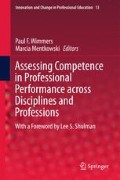Abstract
Professional schools have some common goals, such as developing an identity as a professional person and encouraging lifelong learning. Yet they vary greatly in their characteristics and purposes. Educating professionals requires formal education. Yet, emphasizing formal and informal learning becomes essential with the rise of specialization and technology. Learning in the profession is best understood as a process embedded in social relationships and social practices, and other professionals, clients, learners, patients, and citizens participate in these relationships and practices over time and across settings.
Access this chapter
Tax calculation will be finalised at checkout
Purchases are for personal use only
References
Alverno College Faculty. (1979/1994). Student assessment-as-learning at Alverno College. Milwaukee, WI: Alverno College Institute (Original work published 1979, revised 1985 and 1994).
Alverno-College-Faculty. (2015). Feedback IS teaching. Milwaukee, WI: Alverno College Institute.
Curry, L., & Wergin, J. F. (Eds.). (1993). Educating professionals: Responding to new expectations for competence and accountability. San Francisco: Jossey-Brass.
Doyle, C., Wilkerson, L., & Wimmers, P. F. (2013). Clinical clerkship timing revisited: Support for non-uniform sequencing. Medical Teacher, 35(7), 586–590. doi:10.3109/0142159X.2013.778393
Edmondson, A. C. (2012). Teaming: How organizations learn, innovate, and compete in the knowledge economy. San Francisco: Jossey-Bass.
Frenk, J., Chen, L., Bhutta, Z. A., Cohen, J., Crisp, N., Evans, T., et al. (2010). Health professionals for a new century: transforming education to strengthen health systems in an interdependent world. The Lancet, 376(9756), 1923–1958.
Hout M., & Elliott, S. W. (Eds.). (2011). Committee on incentives in test-based accountability in public education. In: Incentives and test-based accountability in education. Washington, DC: National Research Council.
Isaksen, S. G. (1998). A review of brainstorming research: Six critical issues for enquiry (Monograph #302). Buffalo, NY: Creative Problem Solving Group-Buffalo.
Lamb, B. W., Sevdalis, N., Arora, S., Pinto, A., Vincent, C., & Green, J. S. (2011). Teamwork and team decision-making at multidisciplinary cancer conferences: barriers, facilitators, and opportunities for improvement. World Journal of Surgery, 35(9), 1970–1976.
Mintzberg, H. (2004). Managers, not MBAs: A hard look at the soft practice of managing and management development. Berrett-Koehler.
Parker, G. (1994). Cross-functional Teams. San Francisco: Jossey-Bass.
Peck, C., Gallucci, C., & Sloan, T. (2010). Negotiating implementation of high-stakes performance assessment policies in teacher education: From compliance to inquiry. Journal of Teacher Education, 61, 451–463.
Rogers, G., Mentkowski, M., & Reisetter Hart, J. (2006). Adult holistic development and multidimensional performance. In C. Hoare (Ed.), Handbook of adult development and learning. New York: Oxford University Press.
Ruhstaller, T., Roe, H., Thurlimann, B., & Nicoll, J. J. (2006). The multidisciplinary meeting: An indispensable aid to communication between different specialities. European Journal Of Cancer (Oxford, England: 1990), 42(15), 2459–2462.
Tattersall, M. H. N. (2006). Multidisciplinary team meetings: where is the value? The Lancet Oncology, 7(11), 886–888.
Webb, N. M. (1980). Group process: The key to learning in groups. New directions in the methodology of social and behavioral research, 6, 77–87.
Wenger, E. (1998). Communities of practice: Learning, meaning, and identity. Cambridge: Cambridge University Press.
Author information
Authors and Affiliations
Corresponding author
Editor information
Editors and Affiliations
Rights and permissions
Copyright information
© 2016 Springer International Publishing Switzerland
About this chapter
Cite this chapter
Mentkowski, M., Wimmers, P.F. (2016). Introduction. In: Wimmers, P., Mentkowski, M. (eds) Assessing Competence in Professional Performance across Disciplines and Professions. Innovation and Change in Professional Education, vol 13. Springer, Cham. https://doi.org/10.1007/978-3-319-30064-1_1
Download citation
DOI: https://doi.org/10.1007/978-3-319-30064-1_1
Published:
Publisher Name: Springer, Cham
Print ISBN: 978-3-319-30062-7
Online ISBN: 978-3-319-30064-1
eBook Packages: EducationEducation (R0)

